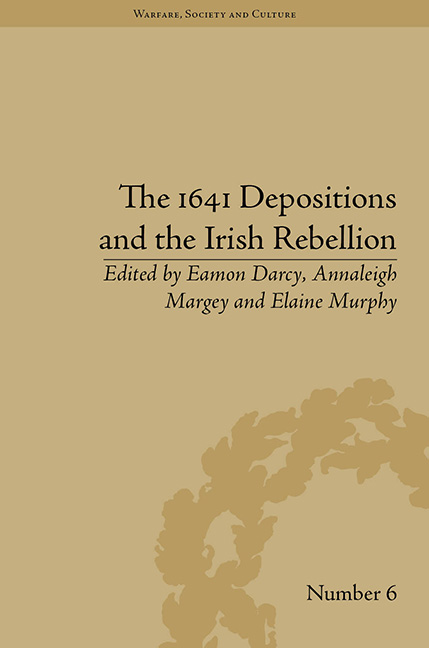Book contents
- Frontmatter
- CONTENTS
- Dedication
- Acknowledgements
- List of Contributors
- List of Figures and Tables
- List of Abbreviations
- Preface
- Introduction
- Part I The Outbreak of the Rebellion
- Part II Social Aspects of the Rebellion
- Part III Political and Military Aspects of the Rebellion
- 9 ‘Holy War’? Religion, Ethnicity and Massacre during the Irish Rebellion 1641–2
- 10 Siege of Duncannon Fort in 1641 and 1642
- 11 1641 and the Shaping of Cromwellian Ireland
- 12 The Trial of Lord Maguire and ‘Print Culture’
- Conclusion: The Rebellion in Text and Context
- Notes
- Index
12 - The Trial of Lord Maguire and ‘Print Culture’
from Part III - Political and Military Aspects of the Rebellion
- Frontmatter
- CONTENTS
- Dedication
- Acknowledgements
- List of Contributors
- List of Figures and Tables
- List of Abbreviations
- Preface
- Introduction
- Part I The Outbreak of the Rebellion
- Part II Social Aspects of the Rebellion
- Part III Political and Military Aspects of the Rebellion
- 9 ‘Holy War’? Religion, Ethnicity and Massacre during the Irish Rebellion 1641–2
- 10 Siege of Duncannon Fort in 1641 and 1642
- 11 1641 and the Shaping of Cromwellian Ireland
- 12 The Trial of Lord Maguire and ‘Print Culture’
- Conclusion: The Rebellion in Text and Context
- Notes
- Index
Summary
Conor Lord Maguire, second baron of Enniskillen, was arrested in Dublin on 23 October 1641 for attempting to seize Dublin Castle. Along with Hugh Mac-Mahon and Colonel John Read, he was transferred to the Tower of London in July 1642. Maguire remained imprisoned in the Tower until a brief escape in the summer of 1644 drew attention to the fact that he had not yet been tried. In November of that year Maguire and his fellow conspirator, MacMahon, stood before a Middlesex jury accused of treason. Although Justice Bacon immediately found MacMahon guilty, Lord Maguire's case had to be postponed when he pleaded that his Irish peerage entitled him to a trial by his peers in Ireland. Although Maguire succeeded in delaying his trial, Judge Bacon ruled against the plea holding that a baron of Ireland was both triable by a jury in England and that parliamentary privilege did not hold in a case of high treason. Maguire's trial finally began on 10 February 1645 with the intention to bring it to a speedy conclusion. Just two days later Maguire was found guilty of treason against both the king and state on account of his involvement in plotting the Irish rebellion of 1641. On 22 February 1645 he was hanged, drawn and quartered at Tyburn in a public execution. While Maguire's trial has been largely neglected by historians of the seventeenth century, it provides key information on the nature of the 1641 plot, its conspirators and the ensuing rebellion in Ulster. Furthermore, its emphasis on the role of religion, the importance of foreign links, the relationship between king and parliament, and its constitutional significance allows the trial of Lord Maguire to become a lens through which key aspects of the mid-seventeenth century can be sharpened and refocused.
Maguire and the 1641 Rebellion
Conor Maguire was born into one of Ulster's most substantial surviving Gaelic families. His family branch benefited from the Ulster plantation due to their support of the English during the Nine Years War and, by 1641, Conor Maguire was the largest single landholder in County Fermanagh.
- Type
- Chapter
- Information
- The 1641 Depositions and the Irish Rebellion , pp. 169 - 184Publisher: Pickering & ChattoFirst published in: 2014



